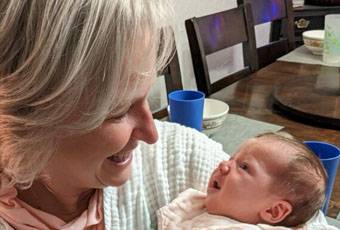 You could say that Janice Bovée, MSN, CNM (Class 22), was born to be a nurse. After all, when she was just four years old, she was drawing pictures of nurses, doctors, pregnant women, and babies.
You could say that Janice Bovée, MSN, CNM (Class 22), was born to be a nurse. After all, when she was just four years old, she was drawing pictures of nurses, doctors, pregnant women, and babies.
“I would dress up with a paper white nurse cap, a bathrobe worn backward as a hospital gown, collect all my dolls in my imaginary nursery, and look at my pediatrician and his nurse with deep respect and seriousness when my siblings or I had office visits,” Bovée said.
Born in Mesa, Arizona, Bovée attended St. Mary’s High School in downtown Phoenix. Her interest in nursing seemingly never waned.
“I was fortunate to know my destiny very early in my life,” Bovée said. “When I was 10 years old, I begged my mother to sign me up at the local nursing home as a candy-striper volunteer. However, I was too young for the program. I finally became a candy-striper through the American Red Cross program at age 16.”
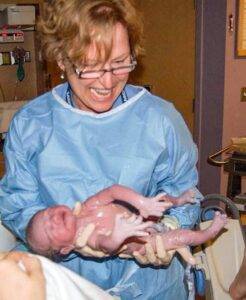 The experience only strengthened her resolve to become a nurse. Once she had her driver’s license, she would go to the hospital and watch the babies, nurses, and doctors through the nursery windows.
The experience only strengthened her resolve to become a nurse. Once she had her driver’s license, she would go to the hospital and watch the babies, nurses, and doctors through the nursery windows.
After graduating from high school, Bovée got married and had her first child. She also enrolled in a junior college nursing program.
“I remember sitting in a nursing classroom, enjoying the lecture, and feeling my baby move,” she said. “My labor and birth were quick and intense, a surprise breech baby, and a new awareness of what childbearing involved. I was still recovering from the work of it when I learned that I was expecting again nine months later.”
Bovée graduated with an associate degree in nursing at the same time her second child turned one year old in 1978. She began working as an RN in labor and delivery and the emergency room at a small, rural hospital nearby. As she gained experience, she also worked in newborn and pediatric ICUs, operating rooms, and office clinical sites.
“I absolutely loved the labor and delivery and emergency departments,” Bovée said. “I actually worked from 3-11 p.m. in the emergency department and then went upstairs to work 11 p.m. to 7 a.m. in labor and delivery. I did this for years just because I loved the work.”
When she was 31 years old, Bovée went back to school for her bachelor’s degree. She had thoughts about going to medical school to become an obstetrician but ultimately realized that she truly wanted to be a nurse-midwife. She put that plan on hold until, at the age of 43, she went back to school to become a nurse-midwife. She was living and working in rural Washington state at the time, so Frontier’s Community-based Nurse-Midwifery Education Program was the ideal solution to allow her to continue to work while also pursuing her degree.
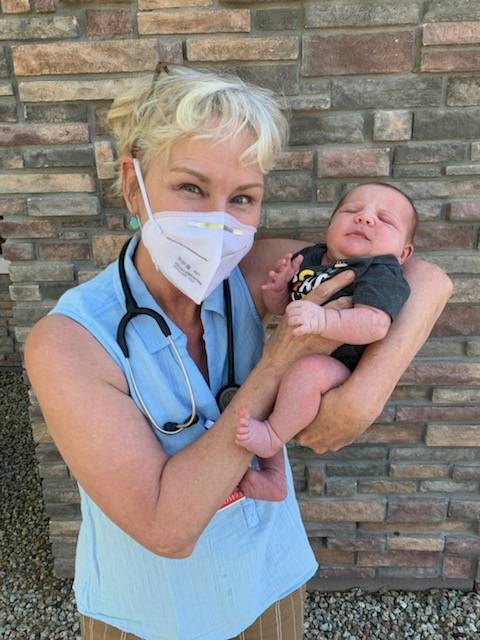 “I was in class number 22,” Bovée said. “What a fabulous experience that was! The two trips to Hyden for the Frontier and Clinical Bounds were highlights in my life. It was educational and inspiring. I called it Midwife Cheer Camp, and it was dynamic. For Frontier Bound, there was a severe snowstorm, and several of us students were stuck at the Lexington Airport waiting for transportation to Hyden. We waited, worried and disappointed. Then suddenly, here comes a school bus with chains on all tires. The doors opened, and there stood Kitty Ernst hollering at us to get in. She had an ice chest full of drinks and snacks, the heater making the bus cozy, and she laughed, talked, and taught us Frontier midwife songs all the way to Hyden. It was quite a priceless orientation to Frontier.”
“I was in class number 22,” Bovée said. “What a fabulous experience that was! The two trips to Hyden for the Frontier and Clinical Bounds were highlights in my life. It was educational and inspiring. I called it Midwife Cheer Camp, and it was dynamic. For Frontier Bound, there was a severe snowstorm, and several of us students were stuck at the Lexington Airport waiting for transportation to Hyden. We waited, worried and disappointed. Then suddenly, here comes a school bus with chains on all tires. The doors opened, and there stood Kitty Ernst hollering at us to get in. She had an ice chest full of drinks and snacks, the heater making the bus cozy, and she laughed, talked, and taught us Frontier midwife songs all the way to Hyden. It was quite a priceless orientation to Frontier.”
During the clinical portion of the nurse-midwifery program, Bovée was precepted by Susan Dennis, who was also a graduate of FNU’s nurse-midwifery program.
“She was fabulous and gave me all her attention and mentorship,” Bovée said. “We worked in a migrant farmer-workers’ clinic and attended hundreds of births, primarily speaking Spanish only. I became fluent in Spanish, which continues to be a blessing.” Bovée also learned how important of a role preceptors play. It was a lesson that she took to heart and paid forward by precepting and mentoring “hundreds of nurses and student nurse-midwives” over the remainder of her career. In total, Bovée worked 43 years as a Registered Nurse and was a Certified Nurse- Midwife for 23 years.
“I had the privilege of ‘catching’ 1,867 babies and assisted physicians in over 500 cesarean sections,” said Bovée, who moved back to Arizona in 2001. “I have served in nursing leadership at the American College of Nurse-Midwives, the Arizona Nurses Association, and the Arizona State Board of Nursing. I have had the best nursing career ever.”
Back in Arizona, she worked with a large OB/GYN physician-owned practice for five years, then initiated a group prenatal care program that had the support of the physician owner. That program eventually became a nurse-midwifery service with six full-time CNMs.
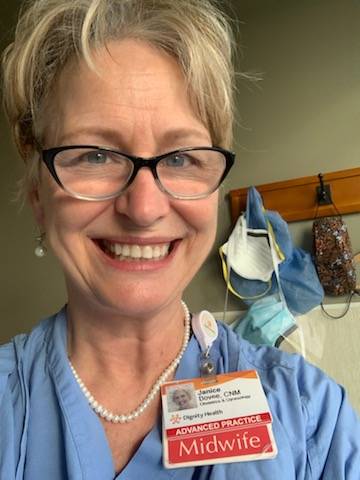 “The hospital where we had privileges was happy with our service,” Bovée said. “The administrators and physicians at the hospital came around to understanding the benefits and qualities of nurse-midwifery care. It involved years of persuasion and persistence. It involved countless revisions of nurse-midwifery documents involving policy, procedure, and delineation of privileges. I consistently worked to be present at the table or at decision-making events. It took us 13 years to get permission for us to have student nurse-midwives in the hospital. I consider this my legacy. My colleagues call me the ‘Pioneer Midwife’ in the east valley, and I am honored to have this title.”
“The hospital where we had privileges was happy with our service,” Bovée said. “The administrators and physicians at the hospital came around to understanding the benefits and qualities of nurse-midwifery care. It involved years of persuasion and persistence. It involved countless revisions of nurse-midwifery documents involving policy, procedure, and delineation of privileges. I consistently worked to be present at the table or at decision-making events. It took us 13 years to get permission for us to have student nurse-midwives in the hospital. I consider this my legacy. My colleagues call me the ‘Pioneer Midwife’ in the east valley, and I am honored to have this title.”
While retired from practice, Bovée lives with and cares for her mother. She also sits on the Arizona Board of Nursing Advanced Practice Advisory Committee and has served as the local chapter president for the American College of Nurse-Midwives.
“I am the happiest woman alive,” Bovée said. “I am grateful, healthy, loved, and ready for my next journey. I am forever a midwife!”
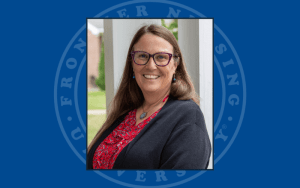
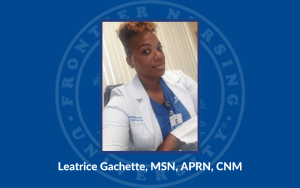
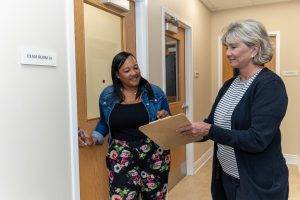



















 Carrie Belin is an experienced board-certified Family Nurse Practitioner and a graduate of the Johns Hopkins DNP program, Johns Hopkins Bloomberg School of Public Health, Georgetown University School of Nursing, and Johns Hopkins School of Nursing. She has also completed fellowships at Georgetown and the University of California Irvine.
Carrie Belin is an experienced board-certified Family Nurse Practitioner and a graduate of the Johns Hopkins DNP program, Johns Hopkins Bloomberg School of Public Health, Georgetown University School of Nursing, and Johns Hopkins School of Nursing. She has also completed fellowships at Georgetown and the University of California Irvine. Angie has been a full-scope midwife since 2009. She has experience in various birth settings including home, hospital, and birth centers. She is committed to integrating the midwifery model of care in the US. She completed her master’s degree in nurse-midwifery at Frontier Nursing University (FNU) and her Doctorate at Johns Hopkins University. She currently serves as the midwifery clinical faculty at FNU. Angie is motivated by the desire to improve the quality of healthcare and has led quality improvement projects on skin-to-skin implementation, labor induction, and improving transfer of care practices between hospital and community midwives. In 2017, she created a short film on skin-to-skin called
Angie has been a full-scope midwife since 2009. She has experience in various birth settings including home, hospital, and birth centers. She is committed to integrating the midwifery model of care in the US. She completed her master’s degree in nurse-midwifery at Frontier Nursing University (FNU) and her Doctorate at Johns Hopkins University. She currently serves as the midwifery clinical faculty at FNU. Angie is motivated by the desire to improve the quality of healthcare and has led quality improvement projects on skin-to-skin implementation, labor induction, and improving transfer of care practices between hospital and community midwives. In 2017, she created a short film on skin-to-skin called 










 Justin C. Daily, BSN, RN, has ten years of experience in nursing. At the start of his nursing career, Justin worked as a floor nurse on the oncology floor at St. Francis. He then spent two years as the Director of Nursing in a small rural Kansas hospital before returning to St. Francis and the oncology unit. He has been in his current position as the Chemo Nurse Educator for the past four years. He earned an Associate in Nurse from Hutchinson Community College and a Bachelor of Science in Nursing from Bethel College.
Justin C. Daily, BSN, RN, has ten years of experience in nursing. At the start of his nursing career, Justin worked as a floor nurse on the oncology floor at St. Francis. He then spent two years as the Director of Nursing in a small rural Kansas hospital before returning to St. Francis and the oncology unit. He has been in his current position as the Chemo Nurse Educator for the past four years. He earned an Associate in Nurse from Hutchinson Community College and a Bachelor of Science in Nursing from Bethel College. Brandy Jackson serves as the Director of Undergraduate Nursing Programs and Assistant Educator at Wichita State University and Co-Director of Access in Nursing. Brandy is a seasoned educator with over 15 years of experience. Before entering academia, Brandy served in Hospital-based leadership and Critical Care Staff nurse roles. Brandy is passionate about equity in nursing education with a focus on individuals with disabilities. Her current research interests include accommodations of nursing students with disabilities in clinical learning environments and breaking down barriers for historically unrepresented individuals to enter the nursing profession. Brandy is also actively engaged in Interprofessional Education development, creating IPE opportunities for faculty and students at Wichita State. Brandy is an active member of Wichita Women for Good and Soroptimist, with the goal to empower women and girls. Brandy is a TeamSTEPPS master trainer. She received the DASIY Award for Extraordinary Nursing Faculty in 2019 at Wichita State University.
Brandy Jackson serves as the Director of Undergraduate Nursing Programs and Assistant Educator at Wichita State University and Co-Director of Access in Nursing. Brandy is a seasoned educator with over 15 years of experience. Before entering academia, Brandy served in Hospital-based leadership and Critical Care Staff nurse roles. Brandy is passionate about equity in nursing education with a focus on individuals with disabilities. Her current research interests include accommodations of nursing students with disabilities in clinical learning environments and breaking down barriers for historically unrepresented individuals to enter the nursing profession. Brandy is also actively engaged in Interprofessional Education development, creating IPE opportunities for faculty and students at Wichita State. Brandy is an active member of Wichita Women for Good and Soroptimist, with the goal to empower women and girls. Brandy is a TeamSTEPPS master trainer. She received the DASIY Award for Extraordinary Nursing Faculty in 2019 at Wichita State University.  Dr. Sabrina Ali Jamal-Eddine is an Arab-disabled queer woman of color with a PhD in Nursing and an interdisciplinary certificate in Disability Ethics from the University of Illinois Chicago (UIC). Dr. Jamal-Eddine’s doctoral research explored spoken word poetry as a form of critical narrative pedagogy to educate nursing students about disability, ableism, and disability justice. Dr. Jamal-Eddine now serves as a Postdoctoral Research Associate in UIC’s Department of Disability and Human Development and serves on the Board of Directors of the National Organization of Nurses with Disabilities (NOND). During her doctoral program, Sabrina served as a Summer Fellow at a residential National Endowment of the Humanities (NEH) Summer Institute at Arizona State University (2023), a summer fellow at Andrew W. Mellon’s National Humanities Without Walls program at University of Michigan (2022), a Summer Research Fellow at UC Berkeley’s Othering & Belonging Institute (2021), and an Illinois Leadership Education in Neurodevelopmental and related Disabilities (LEND) trainee (2019-2020).
Dr. Sabrina Ali Jamal-Eddine is an Arab-disabled queer woman of color with a PhD in Nursing and an interdisciplinary certificate in Disability Ethics from the University of Illinois Chicago (UIC). Dr. Jamal-Eddine’s doctoral research explored spoken word poetry as a form of critical narrative pedagogy to educate nursing students about disability, ableism, and disability justice. Dr. Jamal-Eddine now serves as a Postdoctoral Research Associate in UIC’s Department of Disability and Human Development and serves on the Board of Directors of the National Organization of Nurses with Disabilities (NOND). During her doctoral program, Sabrina served as a Summer Fellow at a residential National Endowment of the Humanities (NEH) Summer Institute at Arizona State University (2023), a summer fellow at Andrew W. Mellon’s National Humanities Without Walls program at University of Michigan (2022), a Summer Research Fellow at UC Berkeley’s Othering & Belonging Institute (2021), and an Illinois Leadership Education in Neurodevelopmental and related Disabilities (LEND) trainee (2019-2020). Vanessa Cameron works for Vanderbilt University Medical Center in Nursing Education & Professional Development. She is also attending George Washington University and progressing towards a PhD in Nursing with an emphasis on ableism in nursing. After becoming disabled in April 2021, Vanessa’s worldview and perspective changed, and a recognition of the ableism present within healthcare and within the culture of nursing was apparent. She has been working since that time to provide educational foundations for nurses about disability and ableism, provide support for fellow disabled nursing colleagues, and advocate for the disabled community within healthcare settings to reduce disparities.
Vanessa Cameron works for Vanderbilt University Medical Center in Nursing Education & Professional Development. She is also attending George Washington University and progressing towards a PhD in Nursing with an emphasis on ableism in nursing. After becoming disabled in April 2021, Vanessa’s worldview and perspective changed, and a recognition of the ableism present within healthcare and within the culture of nursing was apparent. She has been working since that time to provide educational foundations for nurses about disability and ableism, provide support for fellow disabled nursing colleagues, and advocate for the disabled community within healthcare settings to reduce disparities. Dr. Lucinda Canty is a certified nurse-midwife, Associate Professor of Nursing, and Director of the Seedworks Health Equity in Nursing Program at the University of Massachusetts Amherst. She earned a bachelor’s degree in nursing from Columbia University, a master’s degree from Yale University, specializing in nurse-midwifery, and a PhD from the University of Connecticut. Dr. Canty has provided reproductive health care for over 29 years. Her research interests include the prevention of maternal mortality and severe maternal morbidity, reducing racial and ethnic health disparities in reproductive health, promoting diversity in nursing, and eliminating racism in nursing and midwifery.
Dr. Lucinda Canty is a certified nurse-midwife, Associate Professor of Nursing, and Director of the Seedworks Health Equity in Nursing Program at the University of Massachusetts Amherst. She earned a bachelor’s degree in nursing from Columbia University, a master’s degree from Yale University, specializing in nurse-midwifery, and a PhD from the University of Connecticut. Dr. Canty has provided reproductive health care for over 29 years. Her research interests include the prevention of maternal mortality and severe maternal morbidity, reducing racial and ethnic health disparities in reproductive health, promoting diversity in nursing, and eliminating racism in nursing and midwifery. Dr. Lisa Meeks is a distinguished scholar and leader whose unwavering commitment to inclusivity and excellence has significantly influenced the landscape of health professions education and accessibility. She is the founder and executive director of the DocsWithDisabilities Initiative and holds appointments as an Associate Professor in the Departments of Learning Health Sciences and Family Medicine at the University of Michigan.
Dr. Lisa Meeks is a distinguished scholar and leader whose unwavering commitment to inclusivity and excellence has significantly influenced the landscape of health professions education and accessibility. She is the founder and executive director of the DocsWithDisabilities Initiative and holds appointments as an Associate Professor in the Departments of Learning Health Sciences and Family Medicine at the University of Michigan. Dr. Nikia Grayson, DNP, MSN, MPH, MA, CNM, FNP-C, FACNM (she/her) is a trailblazing force in reproductive justice, blending her expertise as a public health activist, anthropologist, and family nurse-midwife to champion the rights and health of underserved communities. Graduating with distinction from Howard University, Nikia holds a bachelor’s degree in communications and a master’s degree in public health. Her academic journey also led her to the University of Memphis, where she earned a master’s in medical anthropology, and the University of Tennessee, where she achieved both a master’s in nursing and a doctorate in nursing practice. Complementing her extensive education, she completed a post-master’s certificate in midwifery at Frontier Nursing University.
Dr. Nikia Grayson, DNP, MSN, MPH, MA, CNM, FNP-C, FACNM (she/her) is a trailblazing force in reproductive justice, blending her expertise as a public health activist, anthropologist, and family nurse-midwife to champion the rights and health of underserved communities. Graduating with distinction from Howard University, Nikia holds a bachelor’s degree in communications and a master’s degree in public health. Her academic journey also led her to the University of Memphis, where she earned a master’s in medical anthropology, and the University of Tennessee, where she achieved both a master’s in nursing and a doctorate in nursing practice. Complementing her extensive education, she completed a post-master’s certificate in midwifery at Frontier Nursing University.









 Dr. Tia Brown McNair is the Vice President in the Office of Diversity, Equity, and Student Success and Executive Director for the Truth, Racial Healing, and Transformation (TRHT) Campus Centers at the American Association of Colleges and Universities (AAC&U) in Washington, DC. She oversees both funded projects and AAC&U’s continuing programs on equity, inclusive excellence, high-impact practices, and student success. McNair directs AAC&U’s Summer Institutes on High-Impact Practices and Student Success, and TRHT Campus Centers and serves as the project director for several AAC&U initiatives, including the development of a TRHT-focused campus climate toolkit. She is the lead author of From Equity Talk to Equity Walk: Expanding Practitioner Knowledge for Racial Justice in Higher Education (January 2020) and Becoming a Student-Ready College: A New Culture of Leadership for Student Success (July 2016 and August 2022 Second edition).
Dr. Tia Brown McNair is the Vice President in the Office of Diversity, Equity, and Student Success and Executive Director for the Truth, Racial Healing, and Transformation (TRHT) Campus Centers at the American Association of Colleges and Universities (AAC&U) in Washington, DC. She oversees both funded projects and AAC&U’s continuing programs on equity, inclusive excellence, high-impact practices, and student success. McNair directs AAC&U’s Summer Institutes on High-Impact Practices and Student Success, and TRHT Campus Centers and serves as the project director for several AAC&U initiatives, including the development of a TRHT-focused campus climate toolkit. She is the lead author of From Equity Talk to Equity Walk: Expanding Practitioner Knowledge for Racial Justice in Higher Education (January 2020) and Becoming a Student-Ready College: A New Culture of Leadership for Student Success (July 2016 and August 2022 Second edition).